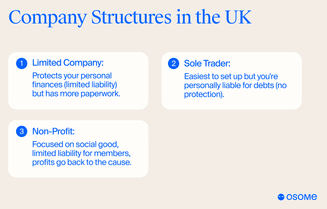How To Register a Company in the UK From the UAE: A Complete Guide
- Modified: 14 April 2025
- 11 min read
- Starting a Company


Heather Cameron
Author
Heather believes in the power of great storytelling and is here to craft compelling copy that informs and inspires readers. With an extensive background in digital marketing, she has experience writing for various industries, from finance to travel. As Osome’s copywriter, Heather creates content that empowers entrepreneurs and small business owners to boost their business with expert guidance, helpful accounting tips and insights into the latest fintech trends.
Need to register a company in the UK from the UAE? We’ll guide you through each step, from picking the right structure to receiving your Certificate of Incorporation.
Key Takeaways
- Understanding the various company structures available in the UK, such as private limited companies, sole traders, and non-profit organisations, is crucial for aligning your business goals and needs.
- Choosing a unique and compliant company name is essential, requiring checks for availability and adherence to specific naming rules set by Companies House.
- Submitting a well-prepared application to Companies House, including key documents like the Memorandum of Association and Articles of Association, and paying the necessary fees to Companies House is the final step to officially establishing your UK company with the company's registered office.
Understanding Company Structures
Before we delve into the specifics of the company registration process, understanding the various company structures available in the UK is indispensable. Each structure has unique benefits and implications, and choosing the right one depends on your business idea and needs.
The most common structures include private limited companies, sole traders, and non-profit organisations.

Private Limited Company
A private limited company is popular for many entrepreneurs due to its numerous advantages. One of the most significant benefits is limited liability, which protects personal assets from business debts and liabilities. This limited liability means that if the private company faces financial trouble, the personal finances of the company directors and shareholders remain protected. Other advantages of a private limited company include:
- Separate legal entity
- Perpetual succession
- Easy transferability of shares
- Access to funding through equity
- Tax benefits
These advantages make a private limited company attractive for entrepreneurs looking to start and grow their businesses.
Another advantage is the company’s separate legal identity, simplifying management and enhancing credibility. This structure allows the company to own assets, incur liabilities, and enter into contracts in its own name. Additionally, the ownership of a limited company is divided into shares, and profits are only shared among shareholders, providing flexibility in ownership and ease of transferring shares.
Private limited companies offer several advantages, including:
- Easier access to capital through borrowing and issuing shares
- Increased professionalism and credibility with clients, suppliers, and financial institutions
- A robust framework for growth and stability
Forming a limited company in the UK can provide these benefits and more for your UK company.
Sole Trader vs Limited Company
The biggest difference between being a sole trader and running a limited company comes down to risk. If you're a sole trader, your personal stuff, like your house or car, is on the line if the business goes bust.
Limited companies are different. They protect the owners' personal assets, giving you peace of mind. Think of it like a shield for your savings and belongings.
The downside? Running a limited company can involve more paperwork and keeping on top of the rules compared to being a sole trader. But for many, the benefits of limited liability, being a separate legal entity, and potentially paying less corporation tax outweigh the extra hassle.
Non-Profit organisations
Many non-profits in the UK choose to be "guarantee companies." This means there's a limit to what members can lose if things go wrong – they're only on the hook for a set amount they agreed to beforehand.
Instead of shareholders, guarantee companies have members who act as guarantors. This is perfect for charities, educational groups, or community projects. It gives them a clear way to achieve their goals without worrying about profits while being responsible for their finances.
Choosing a Unique Company Name
Picking a great name for your company is a big part of getting started. But there are a few things to remember to ensure it's legal and available.
First, check that the company name isn't already being used by another company. Companies House, the official registry, can help you with this.
There are also some naming rules:
- Your name must end with "Limited" or "Ltd" (or "Cyfyngedig" and "Cyf" if you're registered in Wales).
- Avoid names that are too similar to existing ones, even if they have slightly different spelling or punctuation.
- Steer clear of offensive words or anything that suggests a government connection without approval.
- You might need special permission for certain words – check with Companies House if you're unsure.
If Companies House decides your name is too similar to another, you might have to pick a new one. But you can still use the same name as another company if Companies House gives you the okay.
Finally, you can also choose a separate "business name" to trade under, as long as it doesn't include terms like "Limited" or "LLP". This gives you more flexibility with your branding.
Selecting a Company Formation Package
Osome, for example, offers different company formation packages to fit your needs. Each package has its own set of features, so it's important to choose the one that best suits your situation.
For UK residents starting a limited company, there's a basic plan that includes all the legal paperwork you need. Osome offers a more comprehensive plan with full compliance services if you require more assistance.
Don't live in the UK? No problem! Osome also has a plan designed specifically for non-residents that helps with company registration and keeps you compliant. By exploring these options, you can find the perfect package to smoothly get your business off the ground.
Entering Your Company Details
During the company registration process, providing accurate new business details is imperative. You need to provide a company address, details of at least one director and at least one shareholder, and information on share distribution. The appointed company director must be at least 16 years old and not disqualified from being a director.
Share distribution details should include the following:
- The value and percentage of ownership for each shareholder
- Allocating one share to each shareholder and setting the value of each share at £ 1 for simplicity
- Providing a Standard Industrial Classification (SIC) code outlines the company’s main activities.
These details are essential for establishing the company’s identity and ensuring compliance with UK regulations. Providing accurate and complete information helps streamline the registration process and avoid potential delays.
Drafting Key Company Documents
Organising your new company isn't just about picking a name and opening a non-resident bank account. You'll need two key documents to run things smoothly and legally: the Memorandum of Association and the Articles of Association.
Think of the Memorandum like a company birth certificate. It lays out the company's main goals, what it can and can't do, how much money it's starting with, and who the original owners are (the shareholders). Everyone involved signs off on this to make it official.
The Articles of Association are more like the company rulebook. They detail how things will run internally, like who makes decisions, how often meetings are held, and how profits are handled. Having both documents in order keeps everyone on the same page – the shareholders, the directors, and anyone else involved. It also shows you're serious and transparent, which is important down the line. It's like having a clear map for your company's journey, ensuring everyone knows where they're going and how to get there.
Submitting Your Application to Companies House
Once you have all your info and documents, it's time to make things official! You can submit your company registration application to Companies House online or by post.
The online option is super speedy – applications submitted before 3 pm usually get registered the same day! Going the postal route takes a bit longer, around 8-10 days, depending on how busy they are. There's a company registration fee you'll need to pay to Companies House as well.
Double-check everything before you submit to Companies House – ensuring all the details are right helps avoid delays or hiccups. Once Companies House gives you the thumbs up, you'll get a Certificate of Incorporation. This fancy document is basically your company's birth certificate, proving it's officially registered in the UK.

Setting Up a Business Bank Account
Now that you're a registered company, it's time to sort out your finances with a business bank account. The UK has many options, from traditional high-street banks to newer FinTech companies. Some company formation process packages even throw in a free setup with banks like Barclays or Lloyds – handy if you go that route.
Opening a business bank account involves a few security checks to prevent money laundering and ensure they know who their customer is (Anti-Money Laundering and Know Your Customer checks, for short). Usually, they'll need to see things like:
- A UK business address for your company
- Someone from your company who lives in the UK (they can be a director or an employee)
- Photo ID
- Proof of residential address for all the directors and anyone who owns a big chunk of the company
- A business plan outlining what you do
Registering for Taxes and Compliance
Upon registering your company, you must register for various taxes and meet compliance requirements. You must register for Corporation Tax within three months of starting business activities. This involves providing the company’s Unique Taxpayer Reference (UTR), registration number, and business activity details.
If your company’s VAT-taxable turnover exceeds £ 90,000 in a 12-month period, you must register for VAT. Voluntary VAT registration can also offer benefits, such as reclaiming VAT paid on goods and services. Additionally, you must register as an employer with HMRC and set up PAYE to handle employees’ wages and tax deductions.
Maintaining accurate records and complying with tax regulations is crucial to avoid penalties and ensure smooth operations. Conducting thorough research or opting for all-inclusive packages can simplify this process and ensure compliance with UK laws.
Establishing Your Registered Office Address
Every UK company needs a registered office address. Think of it as your company's official mailing address – it's where important stuff from the government and other official bodies gets sent. Having one is key to staying compliant and avoiding any fines.
The registered office address you choose can also affect how your company looks. A prestigious official address in a central location can make your business seem more established and professional. It can also be a good way to keep your residential address private, which can be a plus for many business owners.
The most important thing is to pick a registered office address that's easy to get to and receive mail at. That way, you won't miss any important documents. So besides making you legit, having a registered office address service can also give your company a bit of a polish and keep things running smoothly.
Running a business is exciting, but the paperwork can be a headache. Osome takes the stress out of accounting with our range of services, from basic bookkeeping to tax filing and expert advice. Focus on your passion, let Osome handle the numbers – free up your time and gain peace of mind knowing your finances are in good hands.
Maintaining Company Records
Keeping good records is essential for any UK company, not just to stay on the right side of the law but also to run things smoothly. Here's what you need to keep on file:
- A public register of People with Significant Control (PSC) – basically anyone with significant control over who gets to be a director.
- Accounting records – this is everything that comes in and goes out of business bank accounts, including grants and any government support you might receive.
- Details of your company's assets (things you own) and debts (money you owe).
- Information about the people who run the company, like directors, shareholders, and company secretaries.
- Records of any votes or decisions made by shareholders.
Having all this stuff organised and up-to-date helps you avoid any legal trouble and makes it easier to manage your business overall. Think of it like keeping a clean and organised filing cabinet – it saves you time and headaches in the long run!
Summary
In summary, registering a company in the UK from the UAE involves several crucial steps, from choosing the right company structure to maintaining accurate records. Each step, from selecting a unique company name to setting up a business bank account, requires careful consideration and compliance with UK regulations.
By following this comprehensive guide, you can confidently navigate the company registration process and establish a successful business in the UK. The opportunities are vast, and your company can thrive in the UK’s dynamic business environment with the right approach.






